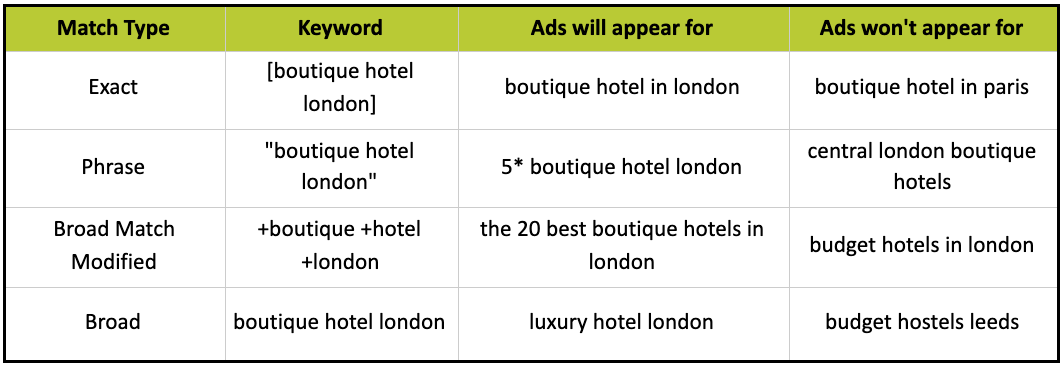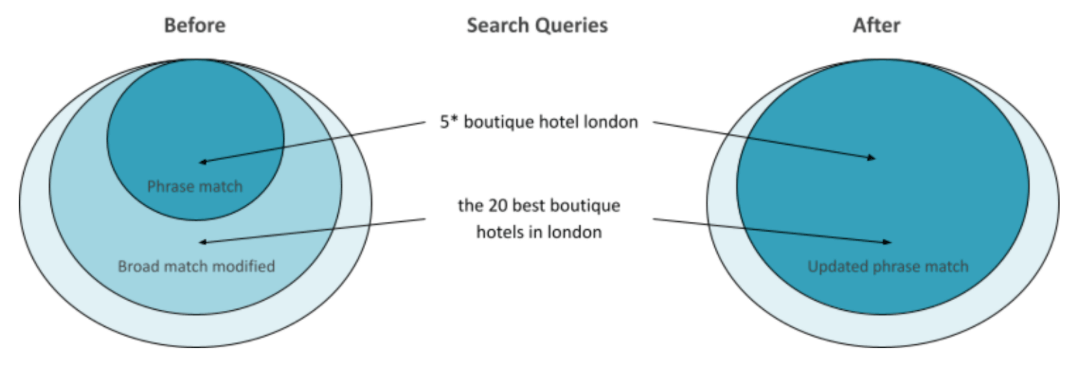Farewell, Broad-Match Modified – The Latest Google Ads Announcement
A few days ago Google announced three big changes to Google Ads keyword match types, with the first to start rolling out in two weeks time.
Broad-Match Modified Will Be Absorbed By Phrase Match
The first change – which will inevitably grab the headlines – is the retirement of the broad match modified (BMM) keyword match type and its consolidation with phrase match. The differences between the two have been narrowing for some time now but the recent announcement confirms Google’s plan to better categorize search intent.
BMM works by adding a ‘+’ in front of each word in a keyword phrase. For a query to match, each word must be present – irrespective of word order. Phrase match was more targeted than BMM, where keywords only matched with queries if the string of keywords was present, in the specified order. The new matching behaviour will expand phrase match to cover both sets of rules while continuing to respect word order.
Before the update:

After the update:

From mid-February, the new matching behaviour will begin to transition to both BMM and phrase keywords. Since both match types will see the new targeting rules there won’t be any immediate action required, historical performance data will remain. From July, advertisers won’t be able to create new BMM keywords as the new behaviour will be fully rolled out across phrase match. Existing BMM keywords will continue to serve but under the updated matching behaviour. This is a clever move by Google, by retiring the broader of the two match types, they are creating the illusion that keyword targeting will become tighter. However, since phrase match will effectively absorb BMM’s rules, the opposite is true.

Exact Becomes More Exact
Secondly, Google has made keyword matching more predictable by prioritising exact match keywords over close variants or other match types with a higher rank, but only when that keyword is identical to the search query. This change will provide advertisers with more control over matching and help simplify granular account structures.
Broad Match Improves Relevancy
Different to broad match modified, broad match is the widest form of keyword targeting. Here, a keyword is triggered when matched with a search query that contains any variation of the keyword (phrases, synonyms, misspellings etc).
A common criticism of the broad match type is that it is indeed too broad. Historically, this match type drove search queries that lacked relevancy which in turn restricted performance. Based on feedback from advertisers, broad match now incorporates additional signals such as landing pages and other keywords in your ad group when matching to search queries.
Final Thoughts
Back in September 2020, Google began to limit our visibility of search query reports which meant that advertiser’s suddenly had less control over keywords they were matching to. The aim was to force businesses into using automated (or smart) bidding strategies going forward, however, the issue was that advertisers were lacking confidence in the ‘smart’ options to deliver results. Through this recent update, if Google are better equipped to determine the intent of searches then the future for ‘smart’ campaigns looks bright.




